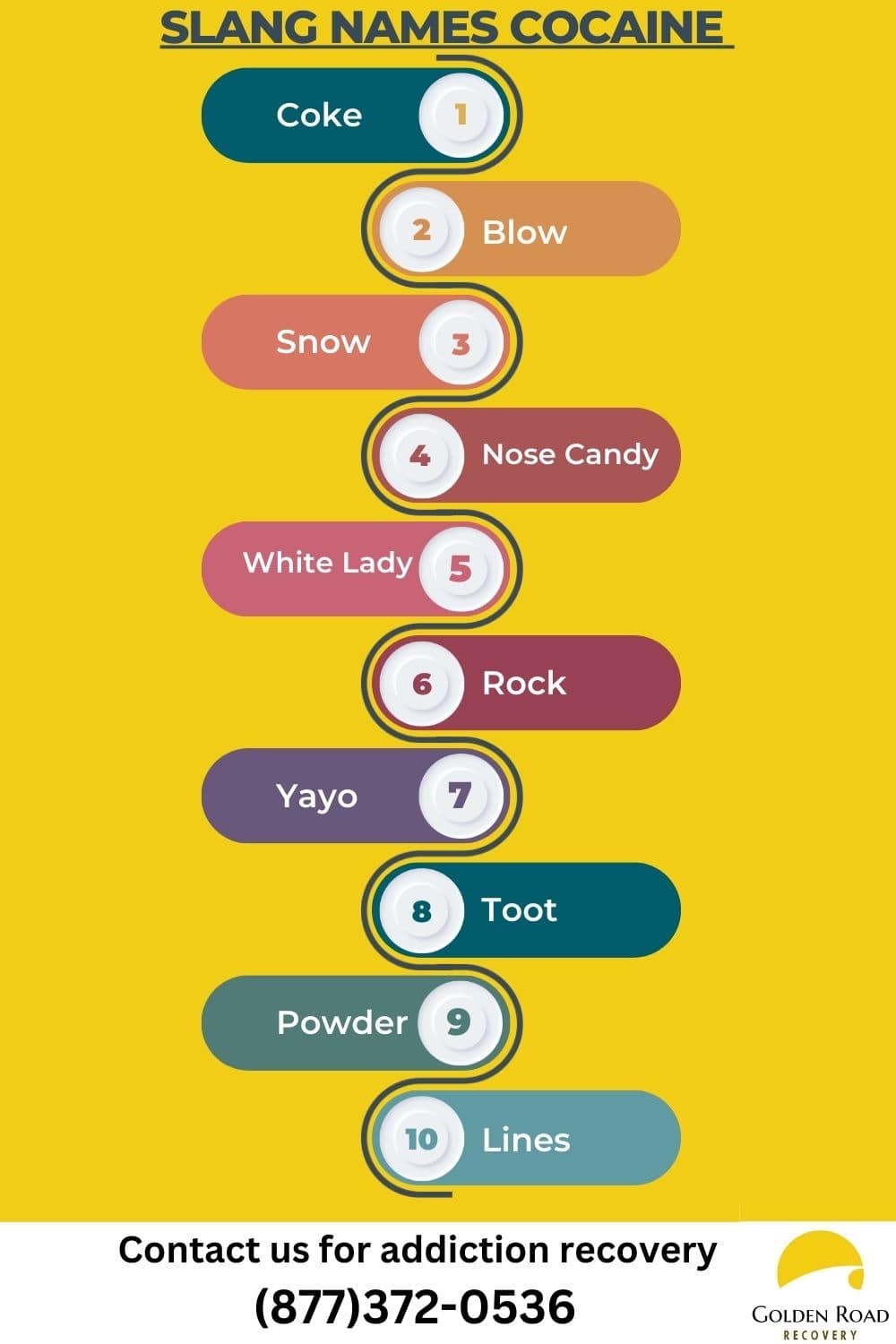Cocaine, a potent and illicit stimulant, is a drug that has captivated both the scientific community and the public alike. Its effects, history, and slang for cocaine are shrouded in mystery and allure.
In this comprehensive article, we will delve into the world of cocaine, exploring its effects on the human body and the common slang for cocaine associated with this powerful substance.
Whether you are seeking knowledge for personal insight or educational purposes, our mission is to provide you with the most detailed and accurate information available on Cocaine addiction.
What is Cocaine?
Cocaine, scientifically known as benzoylmethylecgonine, is a psychoactive substance derived from the leaves of the coca plant native to South America. This powerful stimulant is notorious for its stimulating and euphoria-inducing effects.
It is classified as a Schedule II drug in the United States due to its high potential for abuse and severe psychological or physical dependence.
How does Cocaine work?
Cocaine is a powerful stimulant drug that exerts its effects by interfering with the normal functioning of the central nervous system. To understand how cocaine works, it’s essential to grasp its mechanism of action at the cellular and neurotransmitter level.
Cocaine primarily affects the brain by altering the levels of various neurotransmitters, particularly dopamine, norepinephrine, and serotonin.
Here’s a breakdown of how cocaine works in the body:
- Neurotransmitter Reuptake Inhibition: The primary mode of action of cocaine is to inhibit the reuptake of certain neurotransmitters. Neurotransmitters are chemical messengers that transmit signals between nerve cells (neurons) in the brain. After a neurotransmitter has delivered its signal, it is usually reabsorbed by the neuron that released it, a process called reuptake.
- Dopamine Release: Cocaine interferes with the reuptake of dopamine, a neurotransmitter associated with pleasure, reward, and motivation. When cocaine is ingested, it prevents the reuptake of dopamine in the synaptic cleft—the small gap between neurons. This results in a buildup of dopamine, leading to intense feelings of euphoria, pleasure, and a sense of well-being.
- Norepinephrine and Serotonin: In addition to dopamine, cocaine also affects the reuptake of norepinephrine and serotonin. Norepinephrine is involved in the body’s “fight or flight” response, while serotonin plays a crucial role in regulating mood. The increased levels of these neurotransmitters contribute to the stimulating and mood-altering effects of cocaine.
- Stimulation and Euphoria: The cumulative effect of inhibiting the reuptake of these neurotransmitters is an intense surge of energy, heightened alertness, and an overwhelming sense of euphoria. Users of cocaine often experience a temporary state of exhilaration, which is a significant factor contributing to its abuse potential.

What are the Effects of Cocaine on the body?
These effects are a result of the drug’s impact on the central nervous system, and they can have significant consequences for users. Let’s delve into the effects of cocaine on the body.
Short-Term Effects
- Euphoria: One of the primary short-term effects of cocaine is an intense feeling of euphoria. This intense pleasure results from a surge in the brain’s dopamine levels. Users often describe this sensation as a powerful high, characterized by intense happiness and a sense of invincibility.
- Increased Alertness: Cocaine is well-known for its stimulating properties. It can lead to heightened alertness, increased energy, and enhanced mental clarity. Users may feel more awake and attentive while under the influence of the drug.
- Decreased Appetite: Many cocaine users report a loss of appetite while using the drug. This can lead to significant weight loss, as individuals may go for extended periods without feeling the need to eat.
- Heightened Senses: Cocaine can intensify sensory perceptions, making colors seem brighter, sounds more distinct, and tactile sensations more acute. This heightened sensory experience is part of what makes cocaine appealing to some users.
- Increased Heart Rate: Cocaine use often leads to a rapid increase in heart rate and blood pressure. This cardiovascular stimulation can have serious consequences, especially for individuals with pre-existing heart conditions.
Long-Term Effects
- Addiction: One of the most severe long-term effects of cocaine use is addiction. The pleasurable and euphoric effects of the drug can lead to a strong psychological dependence. Users may find it increasingly difficult to quit, even as they experience negative consequences in their lives.
- Health Risks: Prolonged cocaine use is associated with a range of health risks. These can include cardiovascular issues such as heart attacks and arrhythmias, respiratory problems like chronic cough and lung damage, and neurological complications, including headaches and seizures.
- Mental Health Effects: Cocaine use can also have a profound impact on mental health. It is associated with an increased risk of anxiety, paranoia, and hallucinations, which can be both distressing and dangerous.
- Social and Economic Consequences: Cocaine addiction often leads to severe social and economic consequences. Relationships may deteriorate, employment may be lost, and financial stability may be compromised due to the high cost of sustaining a cocaine habit.
- Legal Consequences: The possession and use of cocaine are illegal in many countries, including the United States. Being caught with cocaine can result in criminal charges and legal penalties.

Some Common Slang for Cocaine
These aliases are often used to discreetly refer to the drug in conversations, text messages, and other forms of communication. Being aware of the Slang for cocaine can help individuals recognize potential drug references and address drug-related issues.
Here are some of the most frequently used Slang for cocaine:
- Coke: “Coke” is perhaps the most widely recognized and commonly used street name for cocaine. It’s a straightforward and easily understood term.
- Blow: Another prevalent street name, “Blow” has been in use for quite some time. Its origins are not entirely clear, but it’s a well-known reference to cocaine.
- Snow: This term alludes to the white, powdery appearance of cocaine. It’s used in a casual context to describe the drug.
- Nose Candy: “Nose candy” is a nickname that highlights the common method of ingesting cocaine, which is through snorting it through the nose.
- White Lady: “White Lady” is a more personified reference to cocaine, emphasizing its alluring and sometimes destructive nature.
- Rock: This term typically refers to crack cocaine, a solid, crystalline form of the drug that can be smoked. Crack is distinct from powdered cocaine in terms of both appearance and method of use.
- Yayo: “Yayo” is another term for cocaine, and it has been used in various pop culture references over the years.
- Toot: “Toot” is another term for ingesting cocaine by snorting it, and it is often used in the context of social or recreational use.
- Powder: Sometimes, cocaine is simply referred to as “powder” when individuals want to be discreet in their communication.
- Lines: People often talk about “doing lines” when they are preparing cocaine for snorting. This term refers to the process of forming lines of powdered cocaine on a surface for consumption.
Read more about: is cocaine a stimulant or depressant
Conclusion
Recovery doesn’t end when you complete a treatment program. At Golden Road Recovery, we understand the importance of ongoing support. Our Rehab Aftercare Program in California is designed to help clients transition back into their daily lives with confidence.
This program offers continued therapy, support groups, and resources to ensure that clients have the tools they need to maintain their sobriety.
At Golden Road Recovery, we understand the harrowing journey of addiction, and we’re here to provide a beacon of hope through our exceptional Addiction Treatment Los Angeles services and Rehab Aftercare Program in California.
Cocaine addiction is a complex and challenging issue that affects not only the individual but also their loved ones. Call our treatment center today at (877) 372-0536 to get more details on Cocaine addiction treatment and lead a happy worry-free life.
FAQs on Cocaine Addiction
Q: Is cocaine illegal everywhere?
A: Yes, cocaine is a controlled substance and illegal in most countries due to its high potential for abuse and harmful effects.
Q: What’s the difference between cocaine and crack cocaine?
A: Cocaine typically refers to the powdered form of the drug, while crack cocaine is a crystallized, smokable form.
Q: Are there any medical uses for cocaine?
A: While cocaine does have some medical applications, its use is highly restricted due to its potential for abuse.
Q: How can someone get help for cocaine addiction?
A: Golden Road Recovery provides treatment options for cocaine addiction including therapy, support groups, and inpatient or outpatient rehabilitation programs.





